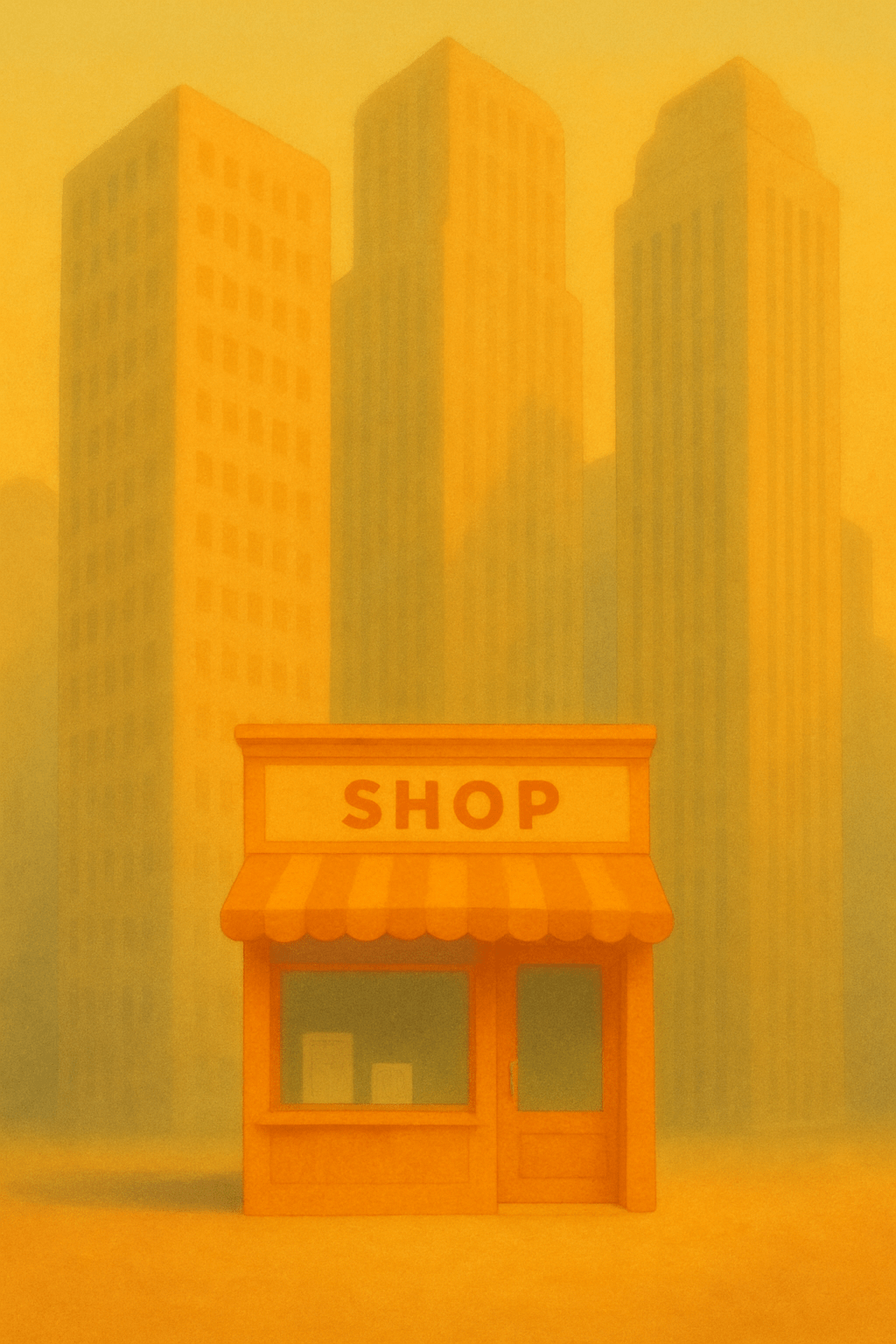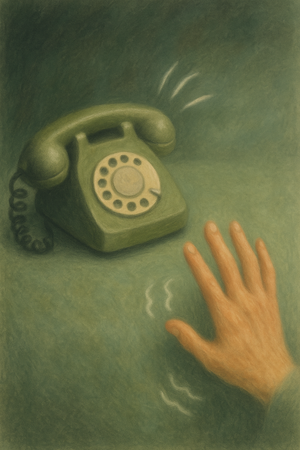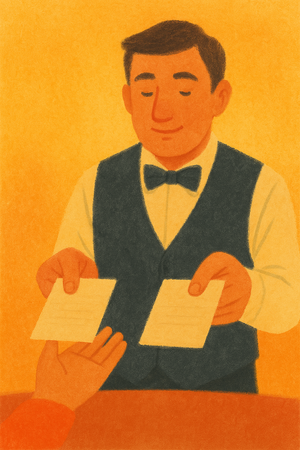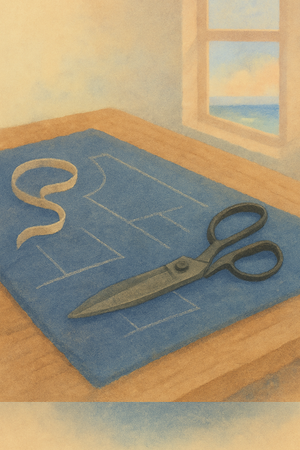Every evening, I take the dog on a post-dinner walk around the block. He's a bit of a fuss pot when it comes to doing his business in our little garden, so we have to venture out for a proper sniff around the neighbourhood.
On the corner of one of the roads we walk is this former hairdresser that's been empty for months now. There are some old circus posters stuck to the windows, a pile of post for the former residents that's been building up for ages, and a "To Let" board that's been there so long it's starting to look like part of the architectural plan. Every time I walk past, I find myself slowing down, peering through the gaps, imagining what it could become.
A tiny bookshop with a proper espresso machine tucked in the back corner? Maybe one of those places that sells beautiful notebooks alongside locally-made ceramics? Something small. Something intentional. Something that makes you think "Crikey, I wish I'd thought of that" when you walk past.
I'm really drawn to that scale. Small enough to wrap your head around, big enough to matter to the people who discover it. The potential of it all gets me properly excited. More excited, if I'm honest, than most of the big-scale projects I've worked on over the years. Which got me thinking about ambition, and scale, and what we're well equipped to build outside of design as independent designers.
When bigger isn't better
For the longest time, I thought ambition in design was supposed to be about scale. The bigger the brand, the more users, the more zeros on the brief, the better. I've worked on important projects for multinational companies, on products used by stadiums full of people every day. Not Facebook or Google scale, but you know, big enough. They're usually in the B2B space, as people like to say.
They're quite cool when you're doing them, but the excitement never seems to last. Maybe I just haven't found the right one, but something about that kind of work always leaves me feeling a bit... empty. Like I'm designing for spreadsheets rather than people. I used to think this made me unambitious. Turns out, I was just ambitious in a different way.
For Starters
I was recently introduced to this newsletter called For Starters, and the biggest compliment I can give it is that it's like Dense Discovery (my favourite newsletter of the last few years), but for those of us who are fascinated and excited by wonderful, small businesses. Written by Danny Giacopelli (formerly of Monocle and Courier magazines), it's all about small, independent businesses that are doing something brilliantly. The kind where you see the photos and immediately think "Blimey, I'd love to go there." New niches, thoughtful branding, people doing familiar things in unfamiliar ways. But doing it independently, on their own terms.
But what really gets my attention each issue are the designer-founded ones. Businesses like MATSU-CHA, a matcha brand run by Japanese graphic designers in Amsterdam (their packaging design is unsurprisingly GORGEOUS). Wylie's Coffee was started by two people from design and marketing backgrounds who now have multiple London locations. One issue has a great interview with the founder of Bread Friends, started by someone who left tech because they couldn't find a proper bagel in their neighbourhood. I'm with them. I bloody love bagels.
And then there's Matt & Jeff's Car Wash in California that runs a micro-bookshop while you wait for your car to be detailed. That's the kind of idea that sounds like it came straight out of a design thinking workshop that got out of hand but actually got built. The sort of thing that makes you think "that's either brilliant or completely barmy" and it turns out to be brilliant, which is quite annoying for those of us still overthinking everything.
What strikes me about all these businesses isn't just that they're beautifully designed (though they are, either from a brand perspective or just in how they've carved out their particular corner of the world). It's that they exist because someone had a very specific vision of what was missing. They saw an empty shop front, metaphorically speaking, and couldn't resist filling it with something better. They've created the kind of exciting local spot or product where you immediately want to spend some time getting to know the founder.
We've already done the hard bit
And here's the thing that really gets me about these stories: freelancing has given me the bravery to think I could do something like this.
There's this big movement at the moment around "designer founders". Y Combinator talks about it, and the design world loves to put the likes of Airbnb on pedestals as the shining example of what a designer founded business should aspire to build. Businesses of that size and impact are amazing. But not every designer needs to have unicorn ambitions. I think there's another scale our design-founder aspirations can be just as meaningful.
Design freelancers might be perfectly positioned to start thriving small businesses. We sense when something's missing from the world. And as freelancers, we've already had to learn how to do absolutely everything in a small way. From the creative work to the invoicing, from client relationships to project management, from marketing ourselves to chasing payments.
We've built networks of other designers, suppliers, and collaborators through our design work. We understand brand positioning because we've done it for clients. And crucially, we've learned to spot gaps in the market.
Most of the briefs we've ever worked on started with someone saying "this isn't quite right, can you make it better?".
It's not that complicated (really)
The practical steps aren't that different from starting freelance design work, really.
Pick something you genuinely use and wish was better designed. Start small. Test the idea with a simple storefront and a few products rather than building a full range. Use your design skills to make it look professional from day one (you'd be amazed how much this matters for credibility). And leverage your existing network, as they might become your first customers, or at least spread the word.
The stories in For Starters make these things feel possible in a way that Silicon Valley success stories never have to me. They're about people who spotted a gap – not a market opportunity, but an actual gap in how things could be better – and filled it with something thoughtful.
Something human-scale.
Will I finally get started?
So where does this leave me? Well, I've got a long list of ideas. Things I've been quietly collecting for years, mostly filed under "nice thoughts but completely impractical." But they're feeling less impractical lately. More like things I might actually bring to fruition in the coming years.
The dog thinks I'm overthinking it, obviously. "Just pick one and see what happens," he says, in that practical way of his. "Worst case scenario, you learn something. Best case scenario, you get to walk past your own shop window and think 'Yeah, I made that.'"
He's got a point, as usual. There's something quietly thrilling about the idea of creating something intentionally small. Something that adds to a smaller or local community rather than trying to dominate it. Something that makes sense at an intentionally smaller scale.
Maybe that's what ambition looks like when you've been freelancing long enough to know what you actually value. Not scale for the sake of it, but impact that you can see and touch and be properly proud of. Something that fits the life you've built, rather than demanding you rebuild your life around it.
There's more to say here about the practical side of making the jump, about finding the right idea, about the particular advantages designers have when it comes to small business. But for now, I'm quite happy just collecting inspiration and walking past empty shop fronts, imagining what they could become.
Just like I've learned to stay intentionally small as a freelancer, these businesses show there's real power in choosing your scale deliberately.
-Tom




